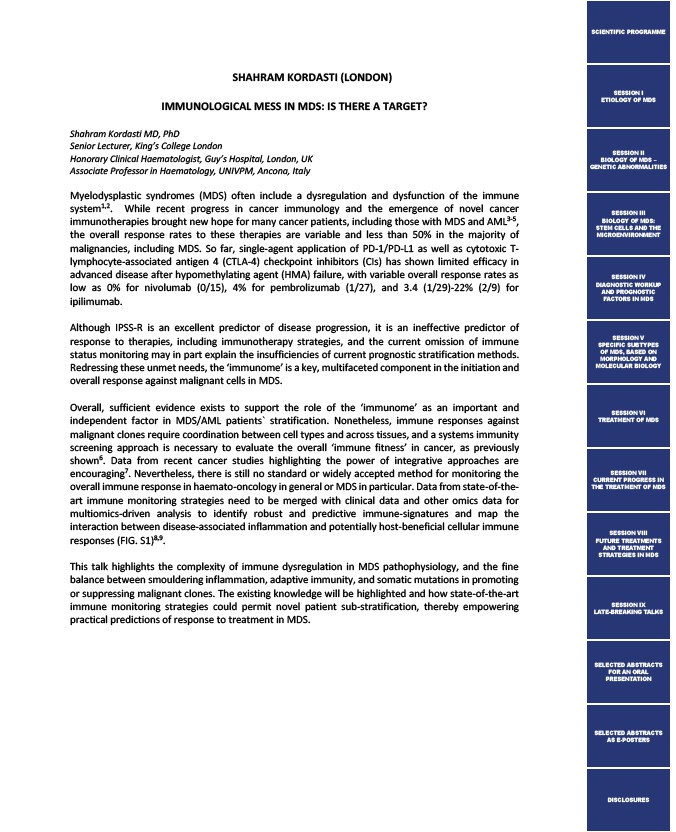
SHAHRAM KORDASTI (LONDON)
IMMUNOLOGICAL MESS IN MDS: IS THERE A TARGET?
Shahram Kordasti MD, PhD
Senior Lecturer, King’s College London
Honorary Clinical Haematologist, Guy’s Hospital, London, UK
Associate Professor in Haematology, UNIVPM, Ancona, Italy
Myelodysplastic syndromes (MDS) often include a dysregulation and dysfunction of the immune
system1,2. While recent progress in cancer immunology and the emergence of novel cancer
immunotherapies brought new hope for many cancer patients, including those with MDS and AML3-5,
the overall response rates to these therapies are variable and less than 50% in the majority of
malignancies, including MDS. So far, single-agent application of PD-1/PD-L1 as well as cytotoxic T-lymphocyte-
associated antigen 4 (CTLA-4) checkpoint inhibitors (CIs) has shown limited efficacy in
advanced disease after hypomethylating agent (HMA) failure, with variable overall response rates as
low as 0% for nivolumab (0/15), 4% for pembrolizumab (1/27), and 3.4 (1/29)-22% (2/9) for
ipilimumab.
Although IPSS-R is an excellent predictor of disease progression, it is an ineffective predictor of
response to therapies, including immunotherapy strategies, and the current omission of immune
status monitoring may in part explain the insufficiencies of current prognostic stratification methods.
Redressing these unmet needs, the ‘immunome’ is a key, multifaceted component in the initiation and
overall response against malignant cells in MDS.
Overall, sufficient evidence exists to support the role of the ‘immunome’ as an important and
independent factor in MDS/AML patients` stratification. Nonetheless, immune responses against
malignant clones require coordination between cell types and across tissues, and a systems immunity
screening approach is necessary to evaluate the overall ‘immune fitness’ in cancer, as previously
shown6. Data from recent cancer studies highlighting the power of integrative approaches are
encouraging7. Nevertheless, there is still no standard or widely accepted method for monitoring the
overall immune response in haemato-oncology in general or MDS in particular. Data from state-of-the-art
immune monitoring strategies need to be merged with clinical data and other omics data for
multiomics-driven analysis to identify robust and predictive immune-signatures and map the
interaction between disease-associated inflammation and potentially host-beneficial cellular immune
responses (FIG. S1)8,9.
This talk highlights the complexity of immune dysregulation in MDS pathophysiology, and the fine
balance between smouldering inflammation, adaptive immunity, and somatic mutations in promoting
or suppressing malignant clones. The existing knowledge will be highlighted and how state-of-the-art
immune monitoring strategies could permit novel patient sub-stratification, thereby empowering
practical predictions of response to treatment in MDS.
SCIENTIFIC PROGRAMME
SESSION I
ETIOLOGY OF MDS
SESSION II
BIOLOGY OF MDS –
GENETIC ABNORMALITIES
SESSION III
BIOLOGY OF MDS:
STEM CELLS AND THE
MICROENVIRONMENT
SESSION IV
DIAGNOSTIC WORKUP
AND PROGNOSTIC
FACTORS IN MDS
SESSION V
SPECIFIC SUBTYPES
OF MDS, BASED ON
MORPHOLOGY AND
MOLECULAR BIOLOGY
SESSION VI
TREATMENT OF MDS
SESSION VII
CURRENT PROGRESS IN
THE TREATMENT OF MDS
SESSION VIII
FUTURE TREATMENTS
AND TREATMENT
STRATEGIES IN MDS
SESSION IX
LATE-BREAKING TALKS
SELECTED ABSTRACTS
FOR AN ORAL
PRESENTATION
SELECTED ABSTRACTS
AS E-POSTERS
DISCLOSURES